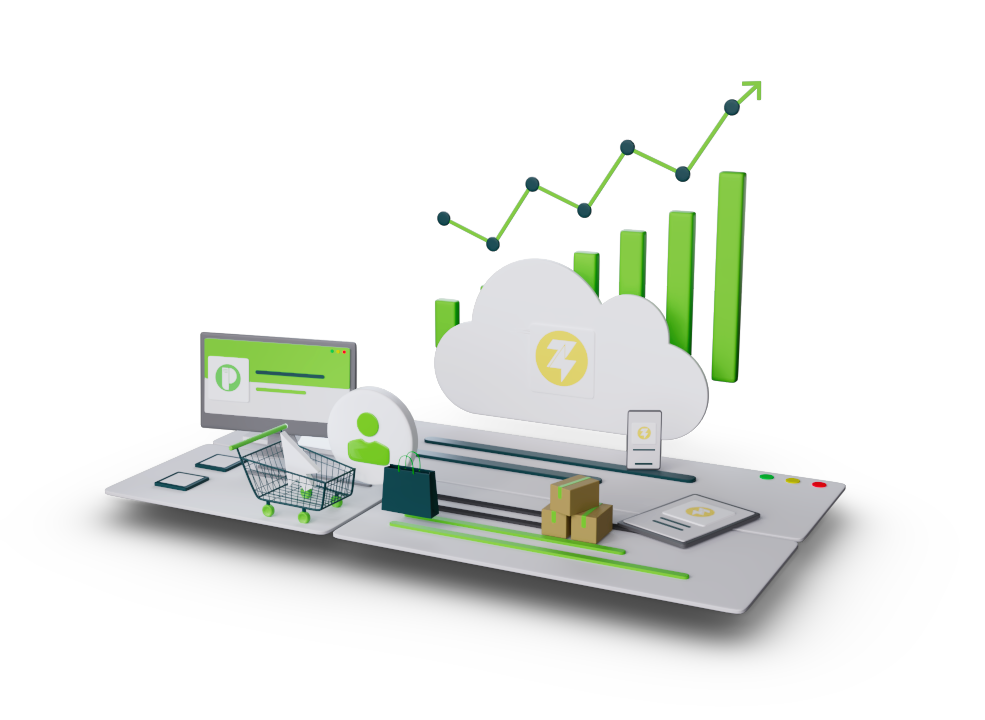Why Supermarkets Should Switch to a Unified Retail Management Solution

As of 2024, around 6 in 10 grocery retailers say disconnected systems are holding back both efficiency and customer satisfaction. The old patchwork approach just isn’t cutting it. Behind the polished storefront of many supermarkets, businesses are juggling a chaotic mix of disconnected systems just to keep things running. Billing happens on one platform, inventory on another, promotions live in spreadsheets, and customer loyalty data is siloed elsewhere. Managers waste hours reconciling mismatched reports. Store staff deal with frustrated customers when products are out of stock. Marketing runs promotions without a clear view of shelf availability. Meanwhile, decision-makers are flying blind with limited real-time data.
Supermarkets today face shrinking margins, fast-moving SKUs, and growing pressure to deliver seamless experiences—whether in-store, online, or hybrid. To play the long game, supermarkets need a connected foundation—one built on integration, real-time visibility, and smarter control. That’s where unified retail management solutions come in. Not just another piece of software, but a strategic tool that ties every part of the retail engine together.
In this blog, we’ll explore why switching to a unified system can transform inventory, workforce management, customer engagement, and market growth for supermarkets.
What Unified Retail Management Solutions Do
This solution brings together all the critical functions that keep a supermarket running—point-of-sale (POS), inventory, customer relationship management (CRM), procurement, supply chain, and analytics—into one integrated ecosystem.
Rather than managing each function in a vacuum, a unified system acts as a single source of truth, empowering supermarkets to:
- Eliminate data silos by centralizing operational data from all departments, ensuring accuracy and consistency across every touchpoint.
- Automate key workflows, such as purchase order generation, replenishment alerts, pricing updates, and promotional rollouts—saving time and reducing human error.
- Enable full omnichannel readiness, ensuring that inventory, pricing, and customer experience are aligned across physical stores, e-commerce sites, mobile apps, and third-party platforms.
These systems are built for scale and speed, offering real-time visibility that supports smarter coordination between stores and warehouses, faster fulfilment, and data-informed decisions.

Deliver effortless omnichannel shopping with Ginesys and Zwing—linking offline stores to eCommerce, apps, and marketplaces.
Making Inventory and Stock Replenishment Simple
Inventory mismanagement in supermarkets can quickly become expensive. Whether it’s overstocking that leads to spoilage or stockouts that drive customers to competitors, poor inventory control impacts both revenue and reputation. A unified retail solution delivers end-to-end inventory visibility across every stock location with:
- Real-time inventory tracking across multiple stores, dark stores, and distribution centres—helping staff know exactly what’s available where.
- Integrated and automated replenishment workflows that analyse sales velocity, forecast demand, and place orders before shelves run empty or warehouses overflow.
- Smarter batch and expiry tracking, which is especially crucial for managing fast-turnover perishables like dairy, meats, and produce.
These platforms also help supermarkets balance regional stock distribution by using historical data and seasonal trends to optimize order frequency and volume. With improved precision, supermarkets can significantly reduce inventory holding costs, minimize waste, and ensure customers consistently find the products they want—when they want them.

Transforming In-Store and Omnichannel Customer Experience
Whether customers are walking into a store or browsing online, they expect speed, consistency, and personalization. Unified retail systems make it possible to deliver these experiences without operational chaos by integrating CRM with sales and inventory data.
This integration allows supermarkets to:
- Deliver personalized promotions and loyalty rewards tailored to individual buying habits—automatically applied at checkout, whether online or in-store.
- Enable effortless omnichannel services like click-and-collect, home delivery, endless aisles, and returns management—without needing multiple platforms.
- Track customer behaviour across all touchpoints, helping marketing and sales teams fine-tune engagement strategies and improve retention.
Real-time inventory sync ensures that product availability is accurate across all sales channels, drastically reducing the frustration of order cancellations and improving brand trust.
Additionally, integrated systems enable front-end staff to access customer profiles, loyalty points, and order statuses instantly. This maximizes personalized service and upselling opportunities even at the checkout counter.

Cut operational costs using Ginesys’ unified ERP suite that automates workflows across procurement, supply chain, and finance.
Data-Driven Decision Making for Every Stakeholder
Retail decisions backed by real-time insights have become a strategic necessity without which operations become disjointed. Unified platforms empower supermarkets to transition from reactive problem-solving to proactive strategy and forecasting with intuitive dashboards and advanced analytics, allowing them to:
- Monitor live sales, gross margins, inventory turns, and SKU performance from a central command centre.
- Benchmark store performance, comparing footfall, conversion rates, and promotional lift across different locations and time periods.
- Identify underperforming products, regions, or time slots with precision, enabling quick interventions.
More than just hindsight reports, these systems offer predictive analytics that recommend replenishment schedules, identify pricing anomalies, and suggest the most effective timing for promotions.
This data-driven foresight empowers leadership to optimize procurement, marketing, and staffing decisions—ultimately leading to better profitability, improved agility, and higher customer satisfaction.
Boosting Operational Efficiency and Cost Control
Managing disconnected retail systems can become a time-consuming, costly affair. Each additional platform means more integrations, duplicated effort, and higher support costs.
Unified retail platforms strip away this complexity, creating a leaner, smarter operation. Efficiency gains include:
- Reduced manual data entry across departments through synchronized workflows—freeing up staff to focus on high-value tasks.
- Lower IT overhead, since there’s only one system to maintain, upgrade, and secure.
- Streamlined vendor and procurement management, with centralized purchase order (PO) generation, invoice matching, and approval processes.
Aligning procurement with real-time inventory and sales data enables supermarkets to optimize stock purchases, reduce spoilage, and cut down on storage costs. This becomes especially important in low-margin grocery retail, where even small inefficiencies can eat into profits.

Compliance and Taxation Handling
In India’s complex tax environment, especially under the Goods and Services Tax (GST) regime, staying compliant across multiple locations can be an operational burden. Unified systems bake compliance into the core of daily retail operations, ensuring accuracy and consistency without the administrative headache with capabilities such as:
- Automated GST calculation across SKUs, categories, and inter-state transactions—reducing manual errors and interpretation gaps.
- Built-in e-invoicing support with configurable templates and audit trails that are ready for inspection at any time.
- Integration with GST portals, making returns, reconciliations, and updates smoother and faster.
When all data flows through a single source, tax treatments remain uniform across outlets, billing counters, and channels, reducing the likelihood of discrepancies and penalties. This also frees up finance teams to focus on strategic financial planning.
Improved Workforce Management and Accountability
With multiple stores and large teams, managing supermarket staff manually—or on disconnected HR systems—can cause errors, miscommunication, and inconsistent service levels. A unified platform has capabilities such as:
- Centralized scheduling, payroll processing, and attendance tracking, allowing HR teams to manage distributed staff from a single dashboard.
- Role-based access and operational controls, which safeguard against internal misuse and enforce task-level accountability.
- Integrated HR tools for managing leave requests, shift swaps, performance evaluations, and even training modules.
With better oversight into employee productivity, absenteeism, and store-level staffing needs, businesses can optimize labour costs while maintaining consistent customer service standards. This also supports better employee engagement, since processes like shift planning and feedback become more accessible and structured.

Optimize supermarket operations with Ginesys’ integrated POS, inventory, and billing in one powerful platform.
Becoming Agile for Market Expansion
In retail, growth often means entering new markets, testing new formats, or launching new digital channels. Unified retail systems give supermarkets the flexibility and control to scale quickly. This kind of agility is critical in a market where consumer preferences shift fast and competition intensifies quickly.
- Standardized onboarding processes for new outlets, including pre-configured POS terminals, inventory rules, and user permissions.
- Easy integration of emerging formats, such as self-checkout kiosks, dark stores, mobile apps, and last-mile delivery partnerships.
- Centralized monitoring and remote control, allowing HQ to launch pilots, monitor KPIs, and tweak store-level operations in real time.
With a unified system, supermarkets can test, learn, and iterate at speed, whether that means entering Tier-2 cities, rolling out express stores, or integrating with delivery platforms—without sacrificing consistency or control.
How Ginesys Empowers Supermarkets with Unified Retail Tech
Ginesys is not just a retail ERP—it’s a purpose-built cloud platform designed for the entire retail value chain. Its modular, scalable architecture unifies key operations like POS, procurement, inventory, finance, warehousing, and order management, offering supermarkets a 360° retail operating system.
Key capabilities include:
- Real-time data visibility across stores, warehouses, and sales channels through a unified dashboard and over 200 flexible reporting templates.
- Omnichannel enablement via Zwing Cloud POS and Browntape OMS, ensuring seamless order sync between marketplaces, ecommerce sites, and offline stores.
- Advanced promotions and loyalty integrations, with CRM-ready POS systems that sync customer data and loyalty points across touchpoints.
- Comprehensive GST compliance, including automated tax calculations, e-invoicing, and audit-ready reports—all integrated with government portals.
- Mobile-first and cloud-based infrastructure, enabling remote access, lower IT overhead, and rapid rollout of new store formats or geographies.
- Smart warehouse and procurement tools, including Android-based WMS for bin-level tracking, order-based inventory allocation, and digital purchase records.

Gain real-time visibility into sales and stock levels across all branches with Ginesys’ centralized retail dashboard.
For supermarkets navigating fast-changing consumer behaviour, tight margins, and operational complexity, fragmented systems are no longer sustainable. The path forward lies in a unified retail management solution—one that brings together every part of the business into a single, agile, and intelligent ecosystem.
With a unified solution like Ginesys, supermarkets can:
- Simplify inventory, procurement, sales, and finance through a central cloud ERP.
- Deliver seamless omnichannel experiences with integrated POS and ecommerce OMS.
- Make smarter, faster decisions with real-time data and customizable reports.
- Strengthen compliance, reduce wastage, and improve workforce coordination.
- Scale with confidence—whether opening new stores or expanding online operations.
Supermarkets that act now can turn operational efficiency into a growth engine. Those that delay risk falling behind.
Ready to unify your retail operations and accelerate your growth? Schedule a demo with Ginesys today and see how we can help.
